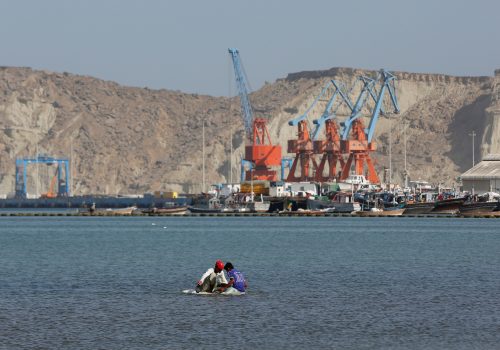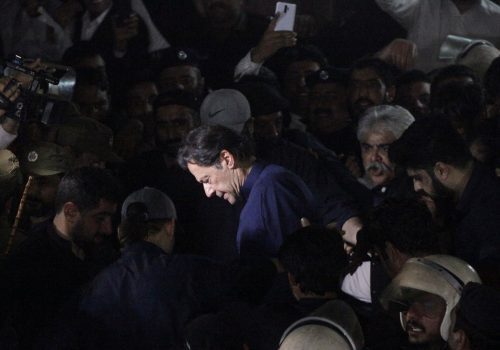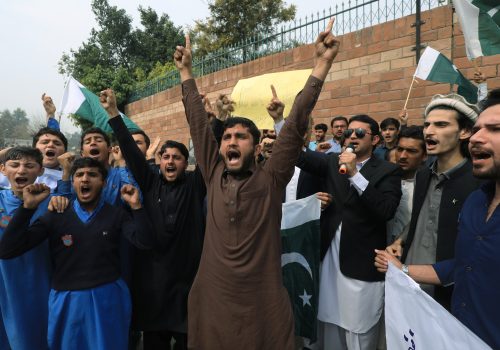Experts react: Elections postponed in Pakistan’s Punjab province
During the evening of Wednesday, March 22, the Election Commission of Pakistan (ECP) announced a decision to delay elections in Punjab, the country’s most populous province, to October 8. These elections were originally scheduled to be held on April 30, and the delay pushes the date of elections beyond the timeline mandated by the country’s constitution.
The Atlantic Council’s Pakistan Initiative asked experts to react to this decision below.
The convoluted decision of the Election Commission betrays the hidden hand of the military yet again in giving the current set up a chance to prove itself by serving out its full term.
Pakistan remains true to form. Power continues to reside in the traditional bastion. As the country hurtles towards the abyss of a financial default amidst an economic crisis, the fractured coalition ruling the country has become ever more reliant on the military in its quest to nullify the street power of the ousted populist prime minister Imran Khan. On its part, the military faces a Hobson’s choice. Should it continue to support the anachronistic, dynastic, and religious parties that have failed numerous times in keeping the promise of democracy and equitable economic development for the people of Pakistan? Or should it find a way to rein in the Trumpian unpredictability of Imran Khan and allow him the chance to return as prime minister under a “free and fair election?”
The wordy and convoluted decision of the Election Commission of Pakistan of this week betrays the hidden hand of the military yet again in giving the current set up a chance to prove itself by serving out its full term. Hence both the national and provincial elections may be expected in October 2023. Unless, of course, the economy implodes sooner and the impoverished masses—mainly youth—come out onto the street to challenge the military’s cohesion and power.
The Military Operations Directorate of the General Headquarters was the principal instrument for this decision. By withholding security forces to ensure a safe election atmosphere, the military has voted, for the time being, in favor of the coalition. Its excuse was the perennial deteriorating law and order situation. Readers will recall that this was the same excuse Imran Khan used to give the previous army chief his second term.
But the speed at which the economy is collapsing and the inability of the government to garner sustained and sustainable external investments and bail-out financing will hurt the poor masses on the one hand and the military’s readiness on the other. It may also heighten the growing socio-political differences between the more urban petit bourgeoisie military recruits (officers and Jawans) and the well-heeled senior officer corps. Imran Khan may light the fuse of this unrest.
Meanwhile, the government has yet to come up with a national consensus on meeting the growing threat of terrorism and militancy that was exemplified by the horrific Peshawar mosque bombing of January 31 this year. This is the second time in the last twelve years that a prime minister named Sharif has proclaimed a National Action Plan only to show it to be a “National Inaction Plan,” leaving it to the military to launch its own autonomous intelligence based operations.
The ostensible master of all that he surveys, new army chief General Syed Asim Munir reflects and represents his petit bourgeoisie roots and upbringing on the one hand and the interests of his army on the other. He will be under pressure from his senior commanders and the rank and file to “sort things out” while resisting the contagion of association with amoral and self-serving politicians.
When will his patience run out?
Shuja Nawaz is a distinguished fellow and the founding director of the South Asia Center of the Atlantic Council, Washington DC. His latest book is The Battle for Pakistan: The Bitter US Friendship and a Tough Neighbourhood. On Twitter: @ShujaNawaz
Already under attack from uncertainty, a balance of payments crisis with its ban on imports, and an elusive IMF deal, this new blow will bleed Pakistan further.
The provincial election for Punjab has been postponed by the ECP, hours after the interior minister spoke in parliament where he also made a case for a delay in the polls. The ramifications of this are multifold. The constitutional implications extend beyond the immediate point of a violation of the principle that elections have to be held within ninety days. What and how will these two provinces run once the caretaker government’s constitutional limit runs out will come up as well. And last but not least, it appears the provincial government’s power to dissolve the assembly is redundant, because elections are clearly dependent on federal departments such as finance and defense agreeing to it rather than the chief minister’s powers to dissolve an assembly and call for a fresh election.
Chances are this issue will end up in court, which is already under attack from the main ruling party and its allies. But whatever the decision, this is the biggest crisis since the restoration of democracy in 2008. And there is no doubt, as in the past, that the establishment has played a role in it, which is said to have been in favor of a delay.
But more than that, this will have a direct impact on the economy. Already under attack from uncertainty, a balance of payments crisis with its ban on imports, and an elusive International Monetary Fund (IMF) deal, this new blow will bleed Pakistan further. This is not going to bring any change to the government’s capacity to take difficult decisions because it still—on the surface, at least—confronts an election in six months time. Ishaq Dar, the finance minister, continues to be in charge and there is no evidence he is planning to change the way he operates.
And the pain the ordinary people are facing and the growing social unrest (which is feeding into the growing support for opposition leader Imran Khan) will end up becoming a decisive factor in the days to come.
Arifa Noor is a journalist and anchor at Dawn News. On Twitter: @arifanoor72
The delay in the Punjab election will only deepen the severity of the crisis and further pit both political actors and the country’s key institutions against each other.
There are no legitimate grounds for a postponement of the provincial election in Punjab. The deadly game of chicken that began with Imran Khan’s refusal to follow the army chief’s dictate and change Pakistan’s intelligence chief in late 2021 has metastasized into a full scale constitutional, political, security, and economic crisis. The delay in the Punjab election will only deepen the severity of the crisis and further pit both political actors and the country’s key institutions against each other.
The political confrontation could be managed through a process of political dialogue—but for years, Imran Khan has flatly refused to engage with his political opponents. Khan’s hesitation is not without merit. His entire political appeal is constructed on delegitimizing Pakistan’s traditional political families—the Bhutto-Zardaris and the Sharifs. Sitting and negotiating with them would be akin to, in Khan’s own words, endorsing “their corruption.” In recent days, Khan’s reportedly more amenable approach has yet to manufacture a breakthrough. The postponement of the Punjab election will almost certainly further erode the hopes for dialogue.
The institutional confrontation is decidedly more complex and will require more than just dialogue. The military has no grounds to be involved in questions of election dates or who is or is not qualified to lead the country. Yet it is the same military that aggressively cultivated Imran Khan’s rise as a new force in Pakistani politics. Like Frankenstein’s monster—and not for the first time—the military’s political engineering has gone awry. Khan is no longer the obedient political partner he once was. A lot of the chaos and disarray in Pakistan today is a product of the military’s continued political interference.
The only legitimate arbiter of what is or is not legal is the Pakistani judiciary—but it is wrought with differences between senior judges. A slew of low quality judgements made to please the military—including the 2017 disqualification of former prime minister Nawaz Sharif—have also reduced the Supreme Court’s stature and ensured that all decisions are viewed through a political lens.
Who, then, can help cut through the toxic partisanship and deep differences that have wrecked the economy and paralyzed the country’s progress? Every possible answer, other than a timely election, is the wrong one.
The postponement of the Punjab election is yet another demonstration of the Pakistani elite continually providing the wrong answers. Expect more of the same in the days and weeks to come.
Mosharraf Zaidi is a founding partner at Tabadlab and a senior advisor at Albright Stonebridge Group. On Twitter: @mosharrafzaidi
If the constitution is the adult version of a coloring book, then all the adults have been coloring outside the lines.
Historically, elections have been postponed for only two reasons in Pakistan—a military coup or a grave emergency. The military coups followed collisions between civilian governments and the military. In recent history, general elections due to be held on January 8, 2008 were postponed for over forty days following the assassination of former prime minister Benazir Bhutto—a transition period from nine years of military dictatorship marked by incidents of terrorism, civil society protests, and a violent outpouring of grief over her murder.
Since his ouster in April 2022, Imran Khan’s political strategy has aimed to force early elections—due to be held in October 2023. After two failed long marches, Khan dissolved two provincial assemblies where his party was in power. Both are crucial: Punjab, which is the electoral key to the prime minister’s seat, and Khyber-Pakhtunkhwa, which is not only Khan’s stronghold but also vulnerable to rising terrorist attacks.
By postponing the provincial assembly elections to October following a decision by the coalition government, the ECP is not only violating the constitutionally mandated ninety days, but it is also defying Supreme Court orders. The court had given the Commission only the “barest minimum” margin outside of ninety days to hold polls. If elections could be held over a month following an intense period of conflict and violence in 2008, six months is neither bare nor minimum.
Both the police and the military have declined to provide security personnel to the ECP to maintain law and order for the elections, and both represent the state. Thus, the message from the state—Khan and Prime Minister Shehbaz Sharif have indicated a willingness to talk—is that the former will not get what he wants at the cost of the law and the constitution.
Indeed, if the constitution is the adult version of a coloring book, then all the adults have been coloring outside the lines. Traditionally, it was just the courts and the military, but the ambit has widened to the ECP and the caretaker governments that are meant to oversee the elections.
More crucially, the ECP’s postponement pits the current coalition government and the military establishment against Khan’s agitational juggernaut on the streets and politicized factions within the judiciary. Unlike other times in Pakistan’s history when polls were deferred due to emergencies, an emergency is being manufactured.
Everyone is coloring, not just outside the lines, but the book itself.
Amber Rahim Shamsi is the director of the Centre for Excellence in Journalism at IBA Karachi. On Twitter: @AmberRShamsi
Timely elections and an adherence to constitutional principles are not just morally imperative, but have become crucial to the country’s medium-term viability.
The postponement of the Punjab provincial elections is both extremely disruptive and entirely predictable. For the last eighteen months, Pakistan has suffered shock after self-inflicted shock.
Consider just some of the most prominent events: the controversial appointment of a new head of Inter-Services Intelligence (ISI); a massive and unsustainable fuel subsidy; a flurry of court verdicts on constitutional matters; a government falling; a finance minister undercut by his own party; parallel provincial assemblies in Punjab; the split of the Pakistan Muslim League–Quaid-i-Azam party, and brief rejection of its votes in chief minister elections before court intervention; massive floods; the arrest and alleged torture of Imran Khan’s chief of staff on sedition charges; the leaking of telephonic conversations between senior provincial and federal ministers, including multiple conversations of the prime minister; the assassination of a top journalist in mysterious circumstances; the unprecedented appearance of the head of the ISI on television, claiming that the “establishment” had decided “last year” to stay within its constitutional role; an assassination attempt on Imran Khan, the country’s most popular politician, that claimed a young father’s life in front of his little children; a senator being blackmailed with intimate videos secretly shot of him and his family; the revelation that the outgoing army chief had amassed wealth many times that of his Indian or US counterparts; another fuel subsidy; and the handing over of 183 square kilometers of land to the military for “corporate farming.”
God alone knows what else is to come. The only constant this time is that every rule, every action, every event, and every principle is open to contestation. We are as far from the rule of law as it is perhaps possible to get.
The ruling class has yet to provide a single instance of putting the nation before narrow self interest. The idea that all individuals and organizations need to be confined by and to enjoy the benefits of clear, public, and stable laws enforced by independent courts remains alien in the country. Ironically, it is the state’s so-called institutions that most prominently flout the law and the constitution, even as they strictly enforce dress and mess codes internally.
In this time, the Pakistani rupee has halved in value, depreciating every two months as much as it did per year in the recent past. Pakistan remains stuck in negotiations with the IMF and other lenders to stave off imminent default. Inflation is touching 50 percent, news of starving parents killing themselves and their children in the hopelessness of extreme poverty have become endemic, and relatively privileged young Pakistanis are leaving for greener (and saner) pastures in record numbers.
The project of stabilizing the Pakistani economy and starting to lift people out of poverty will be a long and difficult one, and thus requires a stable and confident government that can start undertaking long-delayed reforms.
Timely elections and an adherence to constitutional principles are not just morally imperative, but have become crucial to the country’s medium-term viability.
Dr. Ali Hasanain is an Associate Professor of Economics at the Lahore University of Management Sciences (LUMS) and a non-resident senior fellow at the Atlantic Council’s South Asia Center. On Twitter: @AliHasanain

The South Asia Center is the hub for the Atlantic Council’s analysis of the political, social, geographical, and cultural diversity of the region. At the intersection of South Asia and its geopolitics, SAC cultivates dialogue to shape policy and forge ties between the region and the global community.
Related content
Image: Fishermen return from their day of fishing at KhuttiKun New Island, Taluka Mirpur Sakro, Thatta District, Sindh province in Pakistan. Construction of the roads as part of the wind energy project has made the sea more accessible for them to fish and make a better living. Flickr/Asian Development Bank


